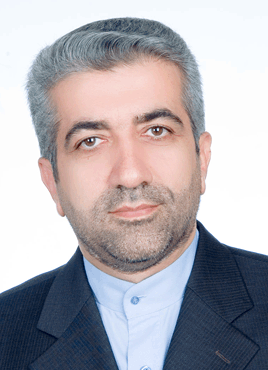- ON THE DECADE
- THE DECADE'S CAMPAIGN
- REPORTING ON PROGRESS
- THE DECADE'S PROGRAMMES
- FOCUS AREAS
-
- Access to sanitation
- Financing water
- Gender and water
- Human right to water
- Integrated Water Resources Management
- Transboundary waters
- Water and cities
- Water and energy
- Water and food security
- Water and sustainable development
- Water and the green economy
- Water cooperation
- Water quality
- Water scarcity
- FOCUS REGIONS
- RESOURCES FOR
- UN e-RESOURCES
International UN-Water Conference. Water in the Green Economy in Practice: Towards Rio+20. 3-5 October 2011
The Green Economy and... Reza Ardakanian
 "Aiming at a green economy for sustainable growth requires solving of pressing water and sanitation issues."
"Aiming at a green economy for sustainable growth requires solving of pressing water and sanitation issues."
Reza Ardakanian
Director of the UN-Water Decade Programme on Capacity Development (UNW-DPC)
Why is 'water in the green economy' an important theme for UNW-DPC?
A green economy can be thought of as one which is low carbon, resource efficient and socially inclusive1. In other words, it stands for an economy that results in improved human well-being and social equity, while significantly reducing environmental and ecological scarcities.
Water supply and sanitation is a key factor determining human well-being (working definition of UNEP). The MDG's report shows that 1.1 billion people lack access to safe drinking water; 2.6 billion people lack adequate sanitation; 1.8 million people die every year from diarrheal diseases, including 90 % of children under the age of 52.
The United Nations formulated an amount of so called Millennium Development Goals, dedicated to reduce poverty and ensure sustainable development. Goal number 7, target 10 is the following one: "Halve, by 2015, the proportion of people without sustainable access to safe water and basic sanitation." The mandate of the UN-Water Decade Programme on Capacity Development is to strengthen the activities of UN-Water members and partners (more than two dozen UN organizations and programmes) and support them in their efforts to achieve the Millennium Goals related to water. As such, UNW-DPC is directly working with Members and partners towards improved human well-being through enhanced water and sanitation, a core element of the Green Economy.
Which change is essential to bring about in order to achieve a truly green economy?
In general, achieving a green economy with a low carbon and resource efficient future will only be possible through a concerted action, the collective vision, creativity, action and support from a broad cross-section of society, including governments, the private sector and consumers (UNEP3).
Changes with respect to water need to aim at three things: Sustainable, efficient and equitable management of water.
Sustainable: To manage water resources in a sustainable manner means in simple words that we only use such amounts of water which are available and regenerated on a long-term basis, so that coming generations have access to the same quantity and quality of water resources as we do.
Efficient water management (physical and economic efficiency4): Integrated Water Resources Management (including all users/sectors, e.g., people, agriculture, industry), improved water utilities (reduced energy input for water supply, reduced water losses), use of waste water, assessing products by their water footprint etc.
Equitable management of water: means that all people have access to water supply (and sanitation). In order to make changes happen capacity development is needed. The different stakeholders need to collaboratively tackle the problems. Therefore, increasingly coming to the forefront are the holistic approaches, methods and skills needed to enable successful cooperation and collaboration, including those communication techniques which enable stakeholders to improve their performance, exchange knowledge, views and preferences and act collectively with a feasible vision of the future, promoting effective implementation (UNW-DPAC5).
Other tools for changes are:
- Better use of pricing and fiscal instruments, e.g., full cost accounting of water: Water is currently only priced and the point of consumption but a full valuing of water in our natural infrastructure is needed. After we use water, what happens? Once humans have used water there is a cost to cleaning it prior to returning it to our ecosystems. So many costal zones are badly polluted with wastewater he said, and the full economic costs of this pollution for fisheries, human health, and recreation are simply not captured by our current economic system (Achim Steiner, Executive Director, UNEP6).
- Encourage private investments: The fact that not all the money needed for water and sanitation services can be provided by the public sectors leading to the need to good regulation for private sector involvement6.
What are the most persistent barriers that inhibit this process of change towards a green economy, especially in relation to water technologies?
These are mostly awareness issues. The urgent need for improvement of water and sanitation needs to be put back on the agenda of governments and societies and preserves top priority. Huge improvements in water technology have been accomplished. Most of the necessary tools and procedures of water technology for sustainable management of water resources are approved and ready for application on larger scales. However, the application of these tools, the implementation of procedures and techniques is lacking behind. There are several reasons for this. One is the economic and financial crisis which lowered the financial potential of many countries to implement innovative water technologies. Another reason may be the lack of dissemination of knowledge. Although the know-how is readily available it might not be accessible on-site. Capacity development is a key issue in this respect, we are actively working on this internally (within UN-Water members and partners) and externally with the 193 member countries of the UN.
How can water technologies contribute to overcoming these barriers?
Innovative water technologies may help to close the increasing gap between demand and supply of water. There are thousands of water technologies that merit attention for increasing the amount of water for drinking, agriculture, and manufacturing or which will allow us to use water more efficiently (UNW-DPC). Technologies are covering different areas and challenges such as desalination, information technology, irrigation, BioTechnologies, etc. Water technology can help to increase the efficiency of water use: it helps to improve water resources management, the supply of drinking water and sanitation.
This is done by:
- water resources assessment;
- reduction of water losses;
- wastewater treatment;
- efficiency improvement of water utilities.
Taking into account the asymmetries between the technological capacities in developed countries and in LDCs, how can we make sure that the transition towards a green economy is "inclusive"; contributing to poverty alleviation instead of aggravating inequalities?
As mentioned before, this needs concerted actions of all countries. Developed countries need to assist LDCs through technical and financial support. This may result in establishing green economy policies to help developing countries attain economic and social gains on several fronts, such as through the deployment of cleaner energy technologies and improved access to energy services; improved resource efficiency through investments in cleaner production approaches; increased food security through the use of more sustainable agricultural methods; and access to emerging new markets for their green goods and services. Improvements in resource efficiency and in diversifying the energy matrix can reduce import bills and protect a country from price volatility in energy markets, while reducing the environmental footprint and associated health costs of economic activity. Of course, each country must assess and evaluate its own resource endowment to determine how to best optimize its opportunities for sustainable economic growth7. UNW-DPC will help to enhance CD with respect to technologies and procedures for improved water supply and sanitation.
One of the tools you focus on in the UNW-DPC session is information technology. Could you explain how information technology can contribute to creating jobs and green growth?
Information technology helps to make information easily and globally accessible, to standardize problem solving approaches, to avoid redundancies and repetition of failures and to create synergies. One example is the UN-Water Activity Information System (UNW-AIS) which evolved from the Capacity Development Information System developed by UNW-DPC.
This information system contains detailed information and documentation about water related projects. We are in the process of enriching the system by e-Training modules and features for social networking for enhanced capacity development with respect to water and sanitation. The lessons learned from the documented case studies help members and partners to adapt their strategies for more effective and efficient capacity development. Our e-Learning courses, in example, will help for direct knowledge transfer to water operators and municipal engineers improving and sustaining green growth.
Why should the UN Conference on Sustainable Development (Rio+20) in June 2012 dedicate special attention to the issue of water? What message would you like to deliver for the Rio+20 Conference?
Water is a key resource for green economy. Water and sanitation need to be moved back into the focus of the international community. We cannot accomplish the MDG related to water without a concerted action involving serious commitment of all member countries. This needs to be put into context with the water, food and energy nexus. The strong inter-dependencies of these three key-elements for human living need holistic approaches for filling the increasing gap between their supply and demand. Aiming at a green economy for sustainable growth requires solving of pressing water and sanitation issues.
What are your expectations on the conference in Zaragoza and what would you like to learn?
My expectations on the conference in Zaragoza are to get a comprehensive understanding of projects successfully implementing policies and technologies contributing to green economy. These cases may act as templates and stimulate the development of green economies in other countries. I would like to get key-elements identified which are essential for transitioning water resource management in the green economy and which should be promoted during the Rio+20 conference.
>> Conference Home
>> Statements from UN Agencies
>> Video recording of sessions

>> Ch1 Water on the Road to Rio+20
>> Ch2 Challenges and opportunities for water in the transition to a GE
>> Ch3 Thematic conference papers
>> Ch4 Conference summary: Water in the GE in practice
>> Ch5 The way forward
>> A1 Water toolbox: A contribution to Rio+20
>> A2 Feedback report
>> A3 Communications report
>> Case papers by tool
>> By region 
>> Developing countries 
>> Developed countries 
>> Agenda 
>> Economic instruments
>> Green jobs
>> Sustainable financing
>> Investments for biodiversity protection
>> Water technology
>> Water planning
>> ESCWA region
>> LAC region
>> Conference daily
>> Interviews with case presenters 
>> Presentations
>> Communications articles
>> Conference media brief 
>> Daily press notes
>> Interviews with session conveners
>> Issues information briefs
>> Tools information briefs
>> Banners
>> Reader on water and the Green Economy 
>> Conference poster 
 >> Discussion forum
>> Discussion forum
 >> Twitter
>> Twitter
>> Water, energy and food security
>> Spanish Business Dialogue
>> Stakeholder dialogue on the Green Economy in Spain
>> Technical visit
>> Organizers
>> Participants
>> Conference committee
>> Rationale
>> Tools
>> Expected outcomes
>> 2nd UNCSD PrepCom
>> Road map to Rio+20
>> Key questions on GE
Copyright | Terms of use | Privacy notice | Site Index | Fraud alert | Help





